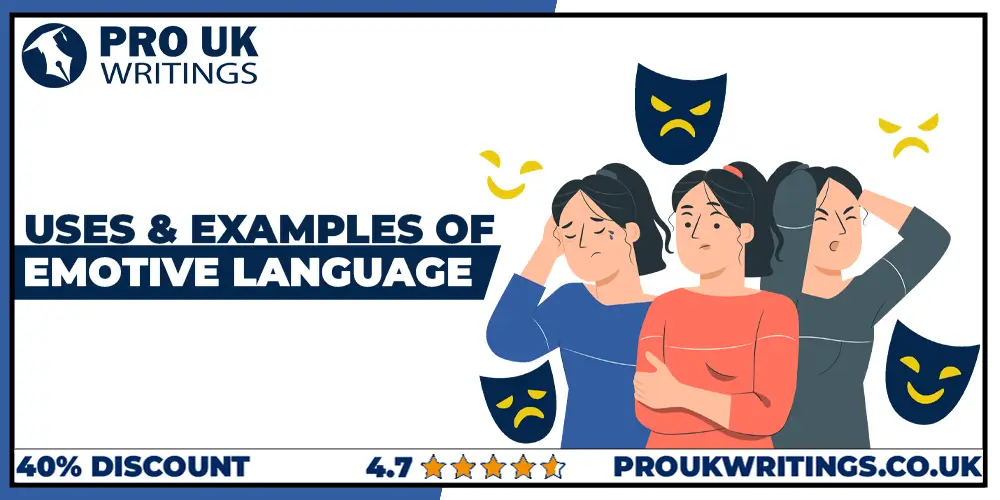What Is Emotive Language?
If you have not got a clue about what is the emotive language meaning? Then let us give you the definition of this term “emotive” word means arousal or to arouse intense feelings while language on the other hand is each countries way of communication so “emotive language” technically means to use such words or sentences that bring out the intense feelings of the reader or listener because words are the most impactful way of leaving your impression onto someone or giving them an insight of your point of view.
How Can We Use Emotive Language?
Well, now that we have our answer to this question what emotive language is let’s take a deep dive into how writers and novelist use this language. Writers in a leaden manner try to utilize emotive language for dramatic situations in story telling process because it helps to make the scenarios more assertive and impactful which results into listener or reader inclining towards the story more.
Emotive language plays significant key role to make the reader or listener understand what emotions the character might be feeling at which phase of the story it makes stories more engaging.
Another great use of emotive language is in the persuasive writing if you do not know in case what persuasive writing is then let us tell you the persuasive writing is where the writer persuades the audience and try to make them comprehend the narrative of the story from their perspective this might execute in the form of essays, articles, dialogues, blogs, and pieces of opinions, using emotive language in persuasive writing is a great way of involving the reader into the concept of story.
When characters piteous emotions are projected on the display like misery, compassion or need for help they are more likely to be more invested in the story. Emotive language is a great way to deliver your message and affiliate with readers on personal level and to make them see your side of the world.
Language For Behavior & Emotions
Emotive language consists of elicit words or phrases that trigger readers or listeners emotions such example of emotive words is moved to tears, heartwarming, perseverance, magical, appalling, tragic, pride and such words like these that are poignant, unaffectionate and assertive are used in emotive language.
Use of any impactful word in a conversation that leaves content or forlorn perception in readers or listener’s mind is counted as one. Here are few examples of how you can use emotive language:
“She was driving a car”
This sentence is not emotive because it does not trigger emotions:
“You should drive carefully”
This sentence is emotive because it shows genuine concern for the sake of well-being.
How Is Emotive Language Useful?
If you want to build a successful career as a novelist or in literacy then acing the emotive language is highly significant for you because emotive language can be really useful if you want to touch the audience on deeper level and take them on roller coaster journey of emotional ride with you because the purpose of emotive language is to coax the reader or listener into seeing the narrative from writer’s perspective.
WHAT ARE SOME EXAMPLES OF EMOTIVE LANGUAGE?
Now that we are well known of the definition for emotive language and what’s emotive language lets have a look at emotive language examples to bring this into practice and master how to use it by examining some great examples
Franklin D. Roosevelt’s “Day Of Infamy” speech (1941)
Franklin D. Roosevelt’s day of infamy speech in 1941 is a very good example to understand the impact of emotive language usage in speeches articles or blogs and stuff. His famous line “A date which will live in infamy” actually displays the negative connotation felt by the speaker which also gives perception of shock and scandalous feelings felt by the American civilization regarding the attack
He had also emphasized the disloyalty with such words as:
Sudden: Something that takes place unexpectedly.
Deliberate: Calculated, intentionally, on purpose.
Unprovoked: Something that happens without justification.
Dastardly: Diabolical, crucial, evil.
John Fitzgerald Kennedy’s Inaugural Address (1961)
John F. Kennedy phrase “My fellow Americans” has been utilized by politicians before and after Kennedys time to bring the politicians closer. Kennedy had used this statement number of times in his speech the reach out to the emotions of the audience. His very famous line “My fellow Americans: ask not what your country can do for you — ask what you can do for your country.” Is massive example of emotive language because it shows altruism, patriotic love and civil duty for the country. “Pay any price” and “bear any burden” were the statements also used in his speech to invoke determination and commitment cause liberty among Americans some of the most assertive words used by Kennedy in his speech to evoke the American Civilization of that time were:
- “Bondage of mass misery”
- “Free society”
- “My fellow citizens of the world”
- “Eternal vigilance”
The emotive language John Fitzgerald Kennedy used in his Inaugural Address (1961) was strategic enough to aim for his goals and strived and then achieve.
“Pride and Prejudice” by Jane Austin (1813)
Emotive language is significant for literacy because when a novel is packed with such intense emotional concepts of love, complexity and confusion jane Austin use of emotive language in Pride and Prejudice (1813) was to deliver:
- Character’s feelings,
- Societal expectations,
- Complexities of romantic relationships.
In the novel when Mister Darcy proposes to Elizebeth his speech was filled with emotive language as he confesses his love but his terms were loaded with negative connotations which eventually led to a rejection by Elizebeth.
These are some of the great examples of emotive language used in history by great personalities to aim at emotions.
Why does the tone matter in emotive language?
When using emotive language in conversation , speeches articles blog or in drama writing make sure that you use the language with appropriate tone and perspectives that are evident to the listener of reader for example “you will lose the race” is a negative statement and could trigger self-doubt within listener while on the other hand “if you do not practice enough you might end up losing the race” is suggestive statement that is counseling the listener into taking advice for the possible Achilles Heel.
WHAT IS EMOTIVE LANGUAGE KS2?
Emotive language (KS2) stands for key stage 2 this language is used widely among individuals who are mature but traditionally it is a tempting idea to plant learning of this idea into primary education among young pupils to understand the conceptional use of poignant words is recognized as emotive language ks2.
For any type of service and Blog information Pro UK Writings have always exceeded all expectations now that you know all about Emotive Language of reflection make sure to also read Gibb’s reflective model, Homework invention, & Rolf et. al model.
FAQs
Find Solutions of your queries

Sebastian James
Blog Writer
Meet Mister Sebastian James who is an accomplished academic writer, who holds great credentials in various different faculties of academic writing having the degree of doctorates. Mr. Sebastian James is the original author all of the content written on this website with great knowledge of academics Mr. Sebastian James is the original upfront writer for Pro UK Writings.
Want Emotive Language Used In Your Assignments?
Contact us now and get emotive language in your assignments & projects from experts!






